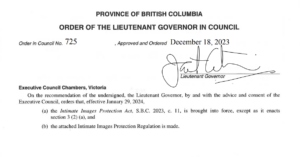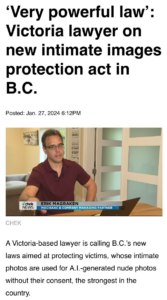This week BC introduced a bill which proposes to give victims of revenge porn more legal remedies.
Imagine you share intimate images with a partner who later abuses that trust and leaks them on the internet. Or imagine someone obtains images without your consent at all and posts them on line. Or threatens to. The proposed BC law creates new remedies for these situations.
But it goes further. Bill 12, titled the “Intimate Images Protection Act” goes on to create the concept of “revocable consent”. Meaning that even if you consented to images being online in the first place (such as a live stream) you may still have a remedy to have them removed.
In the broadest of terms the Bill gives victims (including minors and even deceased individuals) the right to bring an application to a ‘decision maker’ to seek various remedies including the removal of the images and awards of damages. The ‘decision makers’ are broadly defined to include BC Supreme Court judges, provincial court judges, and even tribunal members of BC’s online court the Civil Resolution Tribunal.
In a sweeping power the Bill allows applicants to seek take down orders without notice and even if they sue the wrong party the ‘decision maker’ can make a whole array of orders to whoever can take down the image including
(b) order the person who distributed the intimate image to
(i) delete or destroy all copies of the intimate image in the person’s possession or control, and
(ii) make every reasonable effort to make the intimate image unavailable to others, including by
(A) having the intimate image removed from any platform operated by an internet intermediary and from any other electronic form of application, software, database and communication method, and
(B) having the intimate image de-indexed from any search engine;
(c) order an internet intermediary or other person or organization to
(i) remove the intimate image from any platform operated by the internet intermediary and from any other electronic form of application, software, database or communication method,
(ii) delete or destroy the intimate image, and
(iii) de-index the intimate image from any search engine;
(d) order a person to provide any information the decision maker considers necessary to further the objectives of removal, deletion, destruction or de-indexing of the intimate image;
(e) make any other order the decision maker considers just and reasonable in the circumstances.
Those who want ‘intimate images’ removed have fairly easy remedies with the law proposing a reverse onus saddling respondents with”the burden of proving that the image is not an intimate image because the individual depicted in the image did not have a reasonable expectation of privacy in the image”.
The definition of ‘intimate images’ casts a wide net and covers the following:
a visual recording or visual simultaneous representation of an individual, whether or not the individual is identifiable and whether or not the image has been altered in any way, in which the individual is or is depicted as
(a) engaging in a sexual act,
(b) nude or nearly nude, or
(c) exposing the individual’s genital organs, anal region or breasts,
and in relation to which the individual had a reasonable expectation of privacy at,
(d) in the case of a recording, the time the recording was made and, if distributed, the time of the distribution, and
(e) in the case of a simultaneous representation, the time the simultaneous representation occurred;
Potential damages are broad and include non pecuniary damages, aggravated damages, punitive damages and even administrative penalties.
The law by default protects the identity of the victims.
It also requires internet intermediaries (think platforms like Facebook, Google, Instagram and TikTok) to comply with removal orders and leaves them open to damage claims if they have not “taken reasonable steps to address the unlawful distribution of intimate images in the use of its services.“.
On the topic of revocable consent the proposed law specifically says as follows:
(1) An individual who consented to the distribution of an intimate image depicting the individual may revoke consent to that distribution at any time.
(2) If an individual depicted in an intimate image
(a) consented to the distribution of the intimate image,
(b) later revokes that consent, and
(c) communicates that revocation to a person who distributed the intimate image,
the person who distributed the intimate image must make every reasonable effort to make the intimate image unavailable to others.
(3) The person who distributed the intimate image commits an unlawful act under section 3 if the person does not make the efforts described in subsection (2) within a period of time that is reasonable in the circumstances.
The Bill is worded very broadly and even can apply to images in which they cannot be identified and even cases where they consented to the “image’s distribution by a person other than the individual“. This wording is so broad it could potentially target content such as consensual adult pornography where a person has regret after the fact.
The Bill is not law yet. It is always possible the language will be amended before it does pass into law. The Bill also allows for significant regulations to be passed further clarifying it but as it presently reads it proposes a broad range of far sweeping remedies for victims of revenge porn and more. This is legislation worth keeping an eye on.



